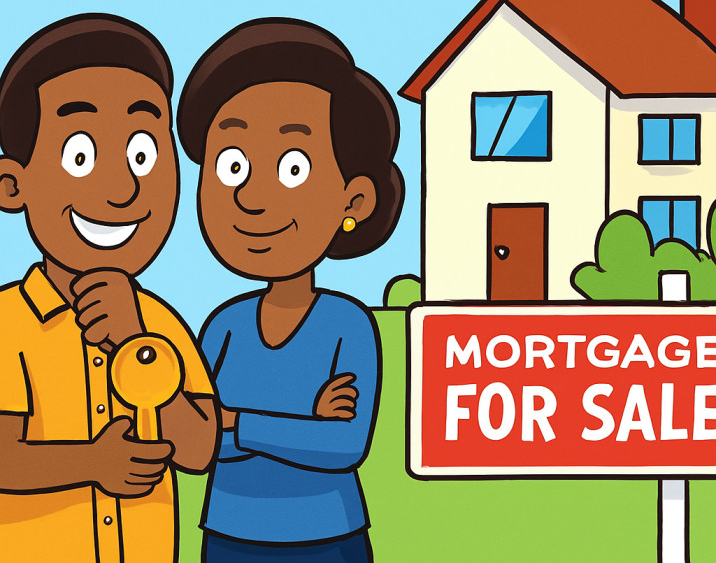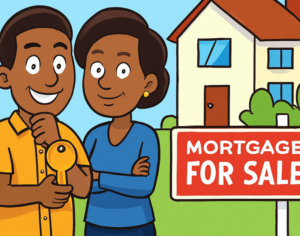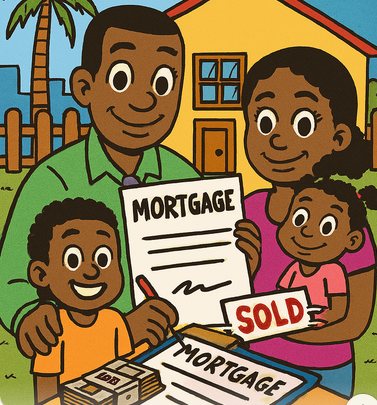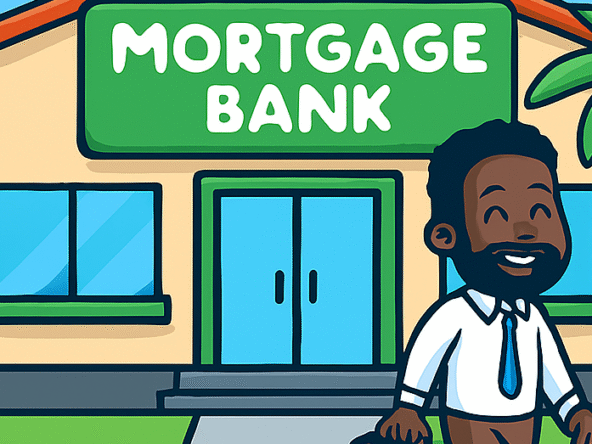The vast majority of real estate in the country are purchased upfront. However, times are changing, and there are now mortgage houses for sale in Nigeria, even though they take different forms. As always, safety is paramount; there is need to determine how safe it is to buy the real estate – whether your deposits are safe, whether the building is safe, and whether the terms of the agreement are profitable.
This article explores how to safely buy houses in Nigeria using mortgages, the benefits of mortgage financing, common pitfalls to avoid, and where mortgage-backed properties are most commonly found. Whether you’re a first-time buyer or planning to invest, this guide will help you navigate the process with confidence.
What Is a Mortgage?
A mortgage is a long-term loan provided by a financial institution to help individuals purchase property. Instead of paying the full cost of a house upfront, the buyer pays a portion (called a down payment), while the bank covers the rest. The buyer then repays the loan over time—typically 10 to 30 years—with interest.
But shine your eyes! If you do not repay the loan as agreed, you could lose the house, and the money you have paid so far.
In Nigeria, mortgage loans are offered by:
- Commercial banks (e.g., Access Bank, Zenith Bank, GTBank)
- Primary mortgage institutions (PMIs) like Abbey Mortgage Bank and Infinity Trust Mortgage Bank
- Cooperative societies and employer-backed housing schemes
- National Housing Fund (NHF), a government initiative offering low-interest loans to contributors
Benefits of Buying a House Through Mortgage
Affordability
One of the biggest advantages of mortgage financing is that it makes homeownership accessible. Instead of needing ₦20–₦50 million upfront, buyers can pay 10–30% of the property value and spread the rest over several years. This is especially helpful for salaried workers and small business owners.
Structured Repayment
Mortgages offer predictable monthly payments, allowing buyers to plan their finances. Most institutions offer flexible repayment terms, and some allow early repayment without penalties.
Access to Better Properties
With mortgage support, buyers can afford homes in secure estates, gated communities, or prime urban locations that would otherwise be out of reach.
Wealth Building
Instead of paying rent, mortgage payments go toward building equity in a property that appreciates over time. Homeownership also provides collateral for future loans and financial leverage.
Government Support
Schemes like the NHF offer single-digit interest rates and long repayment periods, making mortgages more accessible to middle-income earners. Some state governments also partner with developers to offer subsidized housing.
How to Safely Buy a House Using a Mortgage
Buying property in Nigeria requires caution, especially when financing is involved. Here’s how to do it safely:
Work with Reputable Institutions
Choose banks or mortgage providers with a strong track record. Verify their licenses with the Central Bank of Nigeria (CBN) or the Federal Mortgage Bank of Nigeria (FMBN). Avoid unregistered lenders or informal arrangements.
Verify Property Title
Ensure the property has a valid Certificate of Occupancy (C of O), Governor’s Consent, or Registered Deed of Assignment. Hire a lawyer to conduct due diligence and confirm that the title is clean and free of encumbrances.
Understand Loan Terms
Read the fine print. Know your interest rate, repayment period, penalties for late payment, and insurance requirements. Ask questions about hidden fees, processing charges, and valuation costs.
Use Trusted Real Estate Agents
Work with registered developers or agents affiliated with mortgage banks. Avoid deals that sound too good to be true or involve cash-only transactions. Request references and check online reviews.
Inspect the Property
Visit the site in person. Check the building quality, location, access roads, drainage, and proximity to schools, hospitals, and markets. Don’t rely solely on photos or brochures.
Budget for Additional Costs
Beyond the mortgage, you’ll need to pay for:
- Legal fees (5–10% of property value)
- Valuation and survey fees
- Stamp duty and registration
- Insurance (life and property)
- Maintenance and service charges (for estate properties)

The Mortgage Application Process in Nigeria
Here’s a step-by-step breakdown of how to apply for a mortgage:
Determine Your Eligibility
Most banks require:
- A steady income (salary or business)
- Proof of employment or business registration
- A good credit history
- Age between 21 and 60 (some allow up to 65)
Choose a Mortgage Provider
Compare interest rates, repayment terms, and customer service. Some banks offer fixed rates, while others offer variable rates tied to inflation or market conditions.
Get Pre-Approval
Submit your financial documents (bank statements, payslips, tax records) to get pre-qualified. This helps you know how much you can borrow and what price range to target.
Find a Property
Work with developers or agents offering mortgage-backed homes. Ensure the property is approved by your lender and meets their valuation criteria.
Submit Your Application
Provide all required documents, including:
- Property title documents
- Purchase agreement
- Proof of income
- Identification and passport photos
Property Valuation and Legal Review
The bank will conduct a valuation and legal review to confirm the property’s worth and title status.
Loan Approval and Disbursement
Once approved, the bank pays the seller directly. You begin monthly repayments based on your loan agreement.
Common Pitfalls to Avoid When Buying A House Through Mortgage In Nigeria
Buying Unverified Properties
Avoid properties without proper documentation or those under dispute. Always conduct a title search.
Overborrowing
Don’t borrow more than you can comfortably repay. Consider your monthly income, expenses, and emergency needs.
Ignoring Hidden Costs
Factor in taxes, insurance, and maintenance. These can add up and affect your ability to repay.
Skipping Legal Advice
Always involve a lawyer. They’ll help you review contracts, verify documents, and protect your interests.
Assuming All Mortgages Are Equal
Different banks offer different terms. Compare interest rates, fees, and flexibility before committing.
Where Are Mortgage Houses Commonly Found?
Mortgage-backed properties are most available in urban and semi-urban areas where developers partner with banks and government agencies. Key locations include:
Lagos
- Lekki, Ajah, Ikorodu, Alimosho
These areas host gated estates and affordable housing schemes. Developers often work with banks to offer mortgage-ready homes.
Abuja
- Lugbe, Gwarinpa, Kubwa, Lokogoma
The Federal Capital Territory has several government-backed housing projects and private estates offering flexible payment plans.
Port Harcourt
- Rumuodara, Elelenwo, Obio-Akpor
Mortgage-friendly homes are available in new layouts and secure communities.
Ogun State
- Mowe, Arepo, Ibafo, Abeokuta
These areas are popular for budget-friendly housing and proximity to Lagos.
Delta State
- Asaba, Warri, Jeddo, Effurun
Growing urbanization and infrastructure development are attracting developers offering mortgage options.
Other Emerging Areas
- Enugu, Ibadan, Kaduna, Uyo, Benin City
These cities are seeing increased investment in real estate, with mortgage-backed projects gaining traction.
Please note that we are not saying any house offered on mortgage outside these areas listed above is fake; just that mortgages tend to proliferate in the same environments. Real estate developers tend to build their estates and projects in concentrated places with high demand.
Government and Cooperative Support
National Housing Fund (NHF)
Managed by the Federal Mortgage Bank of Nigeria (FMBN), the NHF allows contributors to access low-interest loans for housing. To qualify:
- You must contribute 2.5% of your monthly income.
- You must have contributed for at least six months.
- You can borrow up to ₦15 million, repayable over 30 years.
State Housing Schemes
Some state governments offer subsidized housing through public-private partnerships. These homes are often located in new estates and come with flexible payment plans.
Cooperative Societies
Workplace cooperatives and community groups often pool resources to build homes for members. These schemes offer lower interest rates and flexible terms.
Tips for First-Time Homebuyers
- Start saving early: Even with a mortgage, you’ll need a down payment and other upfront costs.
- Improve your credit score: Pay off debts and avoid missed payments to qualify for better rates.
- Attend housing expos: These events showcase developers, banks, and housing schemes.
- Ask questions: Don’t be afraid to clarify loan terms, property details, or legal issues.
- Think long-term: Choose a home that fits your future plans—family, work, and lifestyle.
Legal Considerations
Nobody likes lawyers, but when it comes to buying property, it is a good idea to involve them so that you can get good advice and documentation. Key documents include:
- Certificate of Occupancy (C of O): Confirms legal ownership.
- Deed of Assignment: Transfers ownership from seller to buyer.
- Survey Plan: Maps the property boundaries.
- Building Plan Approval: Confirms the structure complies with planning laws.
- Governor’s Consent: Required for land transactions under the Land Use Act.
Always register your property with the appropriate land registry to avoid future disputes.
Final Thoughts
Buying a house in Nigeria through a mortgage is a smart and achievable goal—if done correctly. With the right financial planning, legal guidance, and trusted partners, one can get very good real estate deals, and pay gradually, through mortgages.
However, there is still need to be cautious; make sure that the offer is from a trusted source – registered by the relevant authorities. This way, the money one has gone through pains to save up for do not go to waste.




